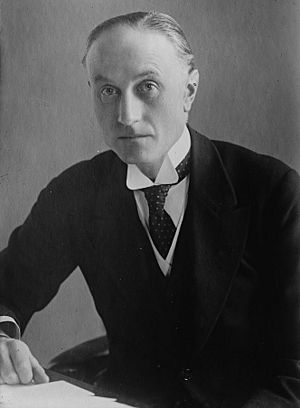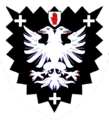Samuel Hoare, 1st Viscount Templewood facts for kids
Quick facts for kids
The Viscount Templewood
|
|
|---|---|
 |
|
| Secretary of State for Air | |
| In office 3 April 1940 – 10 May 1940 |
|
| Prime Minister | Neville Chamberlain |
| Preceded by | Kingsley Wood |
| Succeeded by | Archibald Sinclair |
| Lord Keeper of the Privy Seal | |
| In office 3 September 1939 – 3 April 1940 |
|
| Prime Minister | Neville Chamberlain |
| Preceded by | Sir John Anderson |
| Succeeded by | Kingsley Wood |
| Home Secretary | |
| In office 28 May 1937 – 3 September 1939 |
|
| Prime Minister | Stanley Baldwin Neville Chamberlain |
| Preceded by | Sir John Simon |
| Succeeded by | Sir John Anderson |
| Secretary of State for Foreign Affairs | |
| In office 7 June 1935 – 18 December 1935 |
|
| Prime Minister | Stanley Baldwin |
| Preceded by | Sir John Simon |
| Succeeded by | Anthony Eden |
| Secretary of State for India | |
| In office 25 August 1931 – 7 June 1935 |
|
| Prime Minister | Ramsay MacDonald |
| Preceded by | The Viscount Peel |
| Succeeded by | The Marquess of Zetland |
| Secretary of State for Air | |
| In office 31 October 1922 – 22 January 1924 |
|
| Prime Minister | Stanley Baldwin |
| Preceded by | Frederick Guest |
| Succeeded by | Christopher Thomson, 1st Baron Thomson |
| Secretary of State for Air | |
| In office 6 December 1924 – 4 June 1929 |
|
| Prime Minister | Stanley Baldwin |
| Preceded by | Christopher Thomson, 1st Baron Thomson |
| Succeeded by | Christopher Thomson, 1st Baron Thomson |
| Member of Parliament for Chelsea |
|
| In office 15 January 1910 – 14 July 1944 |
|
| Preceded by | Emslie Horniman |
| Succeeded by | William Sidney |
| Personal details | |
| Born |
Samuel John Gurney Hoare
24 February 1880 London, England |
| Died | 7 May 1959 (aged 79) London, England |
| Political party | Conservative |
| Spouse | Lady Maud Lygon |
| Parent | Sir Samuel Hoare, 1st Baronet (father) |
| Alma mater | New College, Oxford |
| Military service | |
| Allegiance | |
| Branch/service | |
| Years of service | 1916–1918 |
| Rank | Lieutenant colonel |
| Unit | Norfolk Yeomanry Royal Army Service Corps |
| Battles/wars | World War I |
Samuel John Gurney Hoare, 1st Viscount Templewood (born February 24, 1880 – died May 7, 1959), often known as Sir Samuel Hoare, was an important British politician. He was a member of the Conservative Party. He held many important jobs in the government during the 1920s and 1930s.
Hoare was the Secretary of State for Air for much of the 1920s. He also served as Secretary of State for India in the early 1930s. In this role, he helped create the Government of India Act 1935. This law gave India more power to govern itself at a local level. He became very well known as Foreign Secretary in 1935. During this time, he worked with French Prime Minister Pierre Laval on the Hoare–Laval Pact. This plan tried to deal with Italy's takeover of Abyssinia (now Ethiopia). However, the public was very upset, and he had to resign.
He returned to the government in 1936 as First Lord of the Admiralty. Later, he was Home Secretary from 1937 to 1939. He briefly served as Secretary of State for Air again in 1940. He was also the British ambassador to Spain from 1940 to 1944 during World War II.
Contents
Early Life and Education
Samuel Hoare was born in London, England, on February 24, 1880. He was the oldest son of Sir Samuel Hoare, who was also a Conservative Member of Parliament. His family had a long history in banking.
He went to Harrow School and then to New College, Oxford. At Oxford, he studied classics and history. He was a very good student and graduated with top honors. He also played racquets at university.
In 1909, he married Lady Maud Lygon. They did not have any children. Hoare was known for being very hardworking and focused. He was also a good writer.
Start in Politics
In 1905, Hoare started his political career. His father helped him become a secretary to the Colonial Secretary, Alfred Lyttelton. This helped him gain experience. He became a local judge in Norfolk in 1906.
In 1907, Hoare was elected to the London County Council. He represented Brixton and worked on the London Fire Brigade Committee. He served on the council until 1910.
Hoare was elected to the House of Commons in January 1910. He became the Member of Parliament (MP) for Chelsea. He supported ideas like female suffrage (women's right to vote) and public education.
Service in World War I
When World War I started, Hoare joined the Army in 1914. He became a temporary lieutenant in the Norfolk Yeomanry. He learned Russian and was later recruited to work for British intelligence.
In 1916, he became the head of the British Intelligence Mission in Russia. He reported on important events there. In 1917, he moved to Rome, Italy. His job was to help keep Italy in the war. He also met Benito Mussolini and helped him with his early political work.
For his service, Hoare received several awards. These included the Commander of the Order of St Michael and St George (CMG) in 1917.
Between the World Wars
Leading the Air Ministry
After being re-elected to Parliament in 1918, Hoare became Secretary of State for Air in 1922. He was responsible for the Royal Air Force (RAF). He helped combine four private airlines to create Imperial Airways in 1923. This was an early version of today's British Airways.
He made sure the Royal Air Force stayed an independent military branch. He also helped set up air squadrons at Oxford University and Cambridge University to train future RAF officers. He was awarded the Knight Grand Cross of the British Empire (GBE) in 1927. Hoare and his wife, Lady Maud, often traveled by air. They even took the first civilian flight to India in 1927.
Working on Indian Self-Government
From 1931 to 1935, Hoare served as Secretary of State for India. This was a very important role. He worked on giving India more self-government. He attended the Round Table Conferences to discuss India's future.
He worked closely with Mahatma Gandhi during these talks. Hoare helped create the Government of India Act 1935. This was a very long and detailed law. It gave Indian provinces the power to govern themselves. Many people praised Hoare for his hard work on this law.
Foreign Secretary and Public Outcry
In June 1935, Hoare became Foreign Secretary. This was a very high-profile job. At this time, Benito Mussolini's Italy was planning to attack Abyssinia (Ethiopia).
In September 1935, Hoare gave a famous speech at the League General Assembly in Geneva. He said that Britain would stand against "unprovoked aggression." However, Italy invaded Abyssinia in October. Hoare then worked with French Prime Minister Pierre Laval to find a solution. They created the Hoare–Laval Pact. This plan suggested that Italy could keep some of the land it had taken.
When the details of this plan were leaked, there was a huge public outcry in Britain. People were very angry because it seemed to go against what Hoare had said in his Geneva speech. Hoare was forced to resign in December 1935. His replacement was Anthony Eden.
Return to Government Roles
Despite the controversy, Hoare was seen as a very capable politician. In June 1936, he returned to the government as First Lord of the Admiralty. In this role, he supported building up Britain's navy. He also worked to improve naval aviation.
In May 1937, he became Home Secretary. This job involves overseeing law and order within the country. Hoare was known for his interest in reforming the justice system. He worked on plans to change prison rules and even considered ending the death penalty.
In 1938, Hoare played a key role in the Kindertransport program. This effort helped rescue thousands of Jewish children from Europe and bring them to safety in Britain.
He was also part of the discussions leading up to the Munich Agreement in September 1938. This agreement aimed to prevent war with Germany. Hoare believed that Prime Minister Neville Chamberlain's actions were supported by most people at the time.
World War II and Ambassador to Spain
When World War II began in September 1939, Hoare became Lord Privy Seal. This was a role in the small War Cabinet. In April 1940, he briefly returned to the Air Ministry.
After Winston Churchill became Prime Minister in May 1940, Hoare left the government. However, he soon took on a very important new role. He was sent as the British Ambassador to Spain.
In Spain, his main job was to convince Francisco Franco, the Spanish leader, not to join the Axis powers (Germany and Italy). He also helped thousands of Allied prisoners return home from Spanish jails. Hoare used clever tactics to achieve his goals. He successfully kept Spain neutral during the war.
In July 1944, he was given the title Viscount Templewood. His time as ambassador ended in December 1944, and he returned to Britain.
Later Life and Legacy
As Viscount Templewood, he continued to work on public service. He was active in the House of Lords, supporting reforms to the justice system. He also held many leadership positions in different organizations. These included being President of the Lawn Tennis Association and Chancellor of the University of Reading.
He wrote several books about his experiences. These included Ambassador on Special Mission (1946) about his time in Spain, and Nine Troubled Years (1954), a memoir about the 1930s.
Samuel Hoare died on May 7, 1959, at the age of 79. He was buried in Norfolk. Since he had no children, his titles ended when he died.
Images for kids
See also
 In Spanish: Samuel Hoare para niños
In Spanish: Samuel Hoare para niños
 | Laphonza Butler |
 | Daisy Bates |
 | Elizabeth Piper Ensley |



